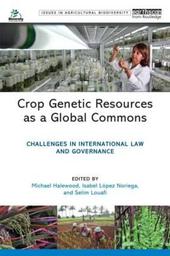
|
Crop Genetic Resources as a Global Commons: Challenges in International Law and Governance
Paperback
Main Details
| Title |
Crop Genetic Resources as a Global Commons: Challenges in International Law and Governance
|
| Authors and Contributors |
Edited by Michael Halewood
|
|
Edited by Noriega Isabel Lopez
|
|
Edited by Selim Louafi
|
| Series | Issues in Agricultural Biodiversity |
|---|
| Physical Properties |
| Format:Paperback | | Pages:424 | | Dimensions(mm): Height 234,Width 156 |
|
| Category/Genre | Agronomy and crop production |
|---|
| ISBN/Barcode |
9781844078936
|
| Classifications | Dewey:343.076 |
|---|
| Audience | | Tertiary Education (US: College) | | Professional & Vocational | |
|---|
| Illustrations |
27 black & white illustrations, 17 black & white tables, 10 black & white line drawings
|
|
Publishing Details |
| Publisher |
Taylor & Francis Ltd
|
| Imprint |
Earthscan Ltd
|
| Publication Date |
12 November 2012 |
| Publication Country |
United Kingdom
|
Description
The Earth's plant genetic resources are a common inheritance of all humankind, which should be held in shared trust for a common future. A key component of the global genetic commons is agricultural biodiversity. Our food and livelihood security depend on the sustained management of these diverse biological resources that are important for food and agriculture. Whilst agricultural biodiversity originates in specific farming communities, it has been shared widely and is considered by many to be part of the much-threatened global commons. This book is about the creation, management and use of the global crop commons. It focuses primarily on the legal and administrative construct that provides the basis of the global crop commons, that is, the multilateral system of access and benefit-sharing created by the International Treaty on Plant Genetic Resources for Food and Agriculture. This is particularly significant because it transcends the traditional dichotomy between privatization and total governmental control. It came into effect in 2006 and the book describes its origins and implementation since then, showing how many international organizations and some developing countries are moving quickly with implementation, while other countries are moving slowly and some multinational corporations are expressing misgivings about the system overall. The authors further analyze current challenges and how they might be resolved.
Author Biography
Michael Halewood is a Senior Scientist and Head of the Policy Research and Support Unit at Bioversity International, Rome, Italy. He is also a qualified barrister and solicitor, and coordinates representation of the International Agricultural Research Centres (IARCs) and of the Consultative Group on International Agricultural Research (CGIAR) in international genetic resources policy-making fora. Isabel Lopez Noriega is a legal specialist in the Policy Research and Support Unit of Bioversity International in Rome. Selim Louafi is based at the Centre de Cooperation Internationale en Recherche Agronomique pour le Developpement (CIRAD), Montpellier, France.
Reviews"A rigorous, in-depth analysis of successful commons governance on a global scale has long been an under-researched, often overlooked and poorly understood area of study. Yet the critical importance collaborative management of global resources requires urgent attention. In this groundbreaking volume, Halewood, Noriega, and Louafi have assembled an international group of leading scholars and practitioners to systematically guide us through the complex terrain of crop genetic resources and agricultural biodiversity as global commons. The thoroughness of the analysis along with the lessons learned from practical applications will serve as indispensable tools for students of all types of global-commons resources." - Charlotte Hess, co-editor with Elinor Ostrom of 'Understanding Knowledge as a Commons' and Associate Dean for Research, Collections, and Scholarly Communication for Syracuse University Library "The preservation and enhancement of agrobiodiversity is of huge importance in a world that shall witness more disruptive climate shocks in the future, and in which food-deficit regions shall be increasingly dependent on food-surplus regions. This volume makes a strong case for governing plant genetic resources in ways that promote the evolution and conservation of agrobiodiversity, and to ensure that they are available to be used by all regions to adapt better to a changing environment. Yet, it is more than just another book about the governance of natural resources by the best experts in the field: it is also an indispensable tool to understand the future of agriculture in a world of dwindling resources and biodiversity loss." - Olivier de Schutter, United Nations Special Rapporteur on the Right to Food "These meticulous studies of the FAO Treaty are of major theoretical and empirical importance to scholars and practitioners seeking a workable, transnational regime to govern all genetic resources for research and benefit sharing under the evolving international legal framework." - Jerome H. Reichman, Bunyan S. Womble Professor of Law, Duke Law School, USA
|